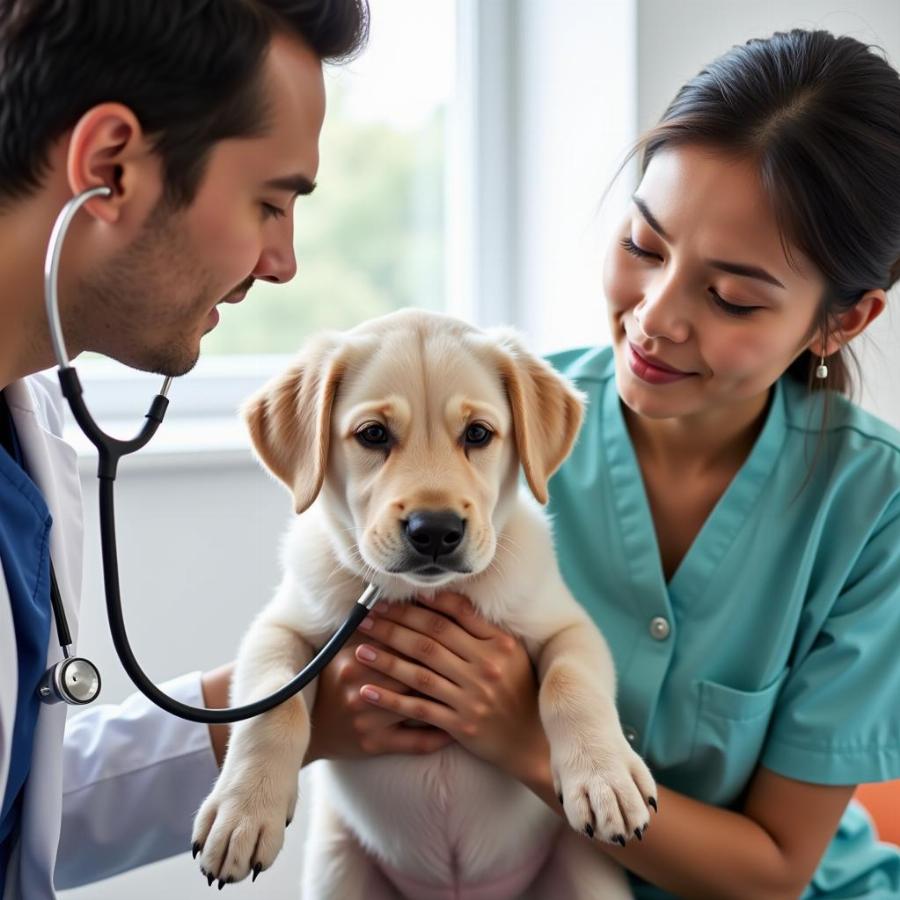Hibiscus flowers bring a splash of color to any garden, but pet owners, particularly those with dogs, might wonder about the safety of these vibrant blooms. While not as toxic as some plants, hibiscus can still pose a moderate risk to our canine companions. This article delves into the specifics of hibiscus and dogs, helping you understand the potential hazards and how to keep your furry friend safe.
Are Hibiscus Poisonous to Dogs?
The answer isn’t a simple yes or no. While hibiscus flowers themselves are generally considered non-toxic to dogs, the plant does contain compounds that can cause upset stomachs. The real danger lies in the hibiscus plant’s stems and leaves. These parts contain higher concentrations of these compounds and can lead to more severe reactions if ingested.
Symptoms of Hibiscus Poisoning in Dogs
If your dog nibbles on hibiscus, especially the stems or leaves, watch out for these signs:
- Vomiting: One of the most common symptoms, often accompanied by undigested plant matter.
- Diarrhea: Can range from mild to severe, potentially with blood or mucus.
- Loss of Appetite: A sudden disinterest in food can signal discomfort.
- Drooling: Excessive salivation is a typical response to ingesting something unpleasant or irritating.
- Lethargy: Your usually energetic pup might seem unusually tired and lackluster.
In more severe cases, you might notice:
- Tremors
- Weakness
- Abdominal Pain
What to Do If Your Dog Eats Hibiscus
Even if your dog only consumes a small amount of hibiscus and shows no immediate symptoms, it’s best to err on the side of caution. Contact your veterinarian immediately.
Here’s what to do:
- Remove Your Dog: Securely separate your dog from the hibiscus plant to prevent further ingestion.
- Identify the Plant: Be prepared to tell your vet what type of hibiscus your dog ate and approximately how much.
- Observe Closely: Monitor your dog for any changes in behavior or the appearance of symptoms.
- Follow Your Vet’s Instructions: They might advise bringing your dog in for examination or suggest ways to monitor them at home.
 A concerned dog owner at the veterinary clinic
A concerned dog owner at the veterinary clinic
Preventing Hibiscus Ingestion
Keeping your furry friend safe starts with prevention:
- Plant Placement: If you choose to grow hibiscus, do so in areas inaccessible to your dog.
- Training: Teach your dog a strong “leave it” command. This can be particularly helpful if you have a garden your dog enjoys exploring.
- Supervision: Never leave your dog unsupervised around potentially toxic plants, even for short periods.
- Safe Chews: Provide plenty of dog-safe toys and chews to keep them occupied and redirect their attention away from your plants.
Dog-Safe Alternatives to Hibiscus
Fortunately, many beautiful and safe alternatives can add color to your garden without risking your dog’s health. Consider these options:
- Roses (Rosa species): With proper care to avoid thorns, roses are a fragrant and safe choice.
- African Violets (Saintpaulia species): These delicate beauties thrive indoors and are non-toxic to dogs.
- Zinnias (Zinnia species): These cheerful annuals come in a rainbow of colors and are generally safe for pets.
- Dog safe shrubs provide a variety of textures and colors for your garden.
Conclusion
While hibiscus flowers offer visual delight, responsible pet ownership requires awareness of potential hazards. By understanding the risks associated with hibiscus and taking preventive measures, you can create a safe and joyful environment for both your canine companion and your love of gardening. Remember, if you suspect your dog has ingested any part of a hibiscus plant, it’s always best to contact your veterinarian for guidance.
FAQs About Hibiscus and Dogs
Q: Are all parts of the hibiscus plant toxic to dogs?
A: While the flowers are generally considered safe, the stems and leaves pose a higher risk as they contain more of the compounds that can upset a dog’s stomach.
Q: How much hibiscus is poisonous to a dog?
A: The severity of the reaction can vary depending on the dog’s size, health, and the amount ingested. It’s always best to contact your vet if you suspect any ingestion.
Q: Can hibiscus be fatal to dogs?
A: While hibiscus poisoning is generally not fatal, it can lead to severe discomfort and complications if left untreated. Always seek veterinary attention if your dog exhibits symptoms after consuming hibiscus.
Q: Are dried hibiscus flowers safe for dogs?
A: While dried hibiscus flowers are used in some teas and treats marketed for dogs, it’s crucial to consult your veterinarian before giving any new food or drink to your pet, including those containing hibiscus.
Q: What are some signs that my dog might have ingested a poisonous plant?
A: Common signs of poisoning in dogs include vomiting, diarrhea, loss of appetite, drooling, lethargy, tremors, weakness, and abdominal pain. If you notice any of these symptoms, contact your veterinarian immediately.
Still have questions?
If you have more questions or concerns about hibiscus and dogs, don’t hesitate to contact us at Beaut Dogs. Our team of experts is dedicated to providing you with reliable and insightful information about the wonderful world of dog ownership.
Beaut Dogs is your trusted source for everything related to dog care. We offer a wealth of knowledge on breed-specific information, health tips, training advice, and much more. Visit our website at https://beautdogs.com or reach out to our support team at [email protected] for personalized guidance and assistance.